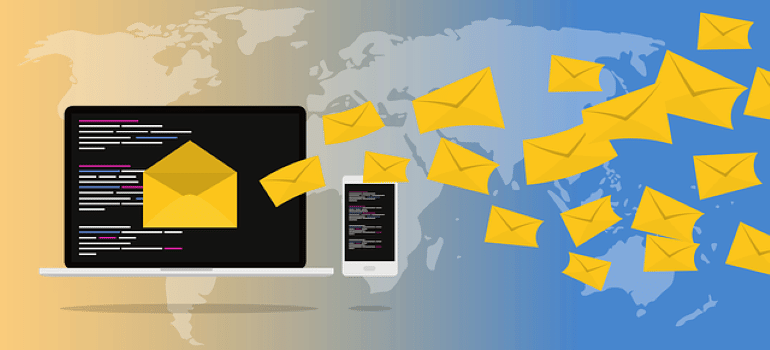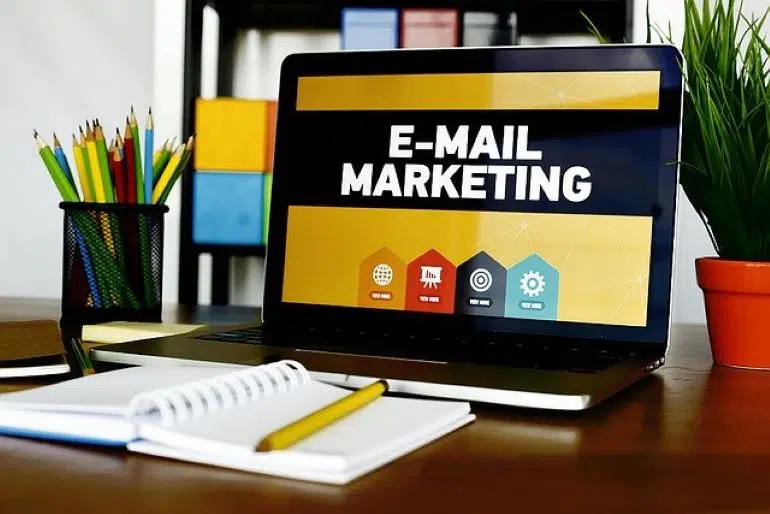Even though the terms “email marketing” and “marketing automation” are often interchangeably used, they are two very different concepts. However, they can work together to benefit your moving business in many different ways. If you use them in the right way, they make a truly powerful combination. So if you’re in the middle of an ’email marketing tools vs email automation’ dilemma, Movers Development is here to help you. In this article, we explore both concepts and how you can benefit from using either one.
What is email marketing?

Much like there are plenty of differences between email as a form of communication and email marketing, there are also plenty of differences between email marketing and email automation. What they’ve got in common is that they both use email as the primary channel to engage with the audience. However, email marketing is set to track only actions taken by the recipients of your email campaign. If you want to be able to analyze your customers’ behavior and moving industry trends, investing in email automation is the way to go.
Why is email marketing not enough?
As your business grows, you’re highly likely to come across a few barriers. This is especially true if you are only using email marketing. Here are the most common challenges that come with using email marketing alone:
- Email marketing is time-consuming simply because there’s no functionality within the Email Service Provider to do any automation. There is a lot of manual work involved to ensure your email blasts are reaching the right audience at the right time.
- When you rely only on email marketing you need to have in mind that you won’t have the functionality to deliver win-ready leads to your sales department. Why? Because the only thing you’ll be tracking is click-through and open rate. This isn’t very helpful to your sales team so they won’t know which leads to contact. They’ll spend too much time contacting leads who aren’t ready to invest in your goods or services.
- Even though you might have an enormous database of leads, you won’t be able to leverage it because you won’t be able to keep them engaged. It can take too much time to create an email blast. This means you won’t have too much time to be strategic about your database sends.
- Email marketing is not scalable if you are growing your business. It’s simple – the more leads you have, the more time it will take to create a mass blast.
- After running a campaign, you want to be able to draw conclusions and get information that will help you improve your future strategies. Using email marketing alone won’t help but by investing in moving industry software or a similar automated solution, you’ll be able to get an in-depth analysis for your every campaign.
What is email automation?
Email automation will give you much more than using only email marketing. It can monitor every digital interaction a lead has with your business, compiles data, and gives you valuable insights you can take advantage of in your future campaigns.

Of course, there are simple email automation options that will only help you with your inbound and outbound marketing. However, if you invest in an advanced marketing automation platform, you’ll not only be able to easily send blast emails. There’s so much more to it. You’d be able to create and manage blog posts and search-optimized landing pages, social media marketing, and integrate them all. You can even invest in additional features such as a moving cost calculator that will help you generate more leads.
Email marketing tools vs email automation – how can they benefit your business?
To help you understand the difference better, here are the main differences between email marketing tools vs email automation.
Email vs web behavior tracking
Most differences between email marketing tools vs email automation come from the type of data platforms collect. Email marketing tools track recipients’ behaviors within your email campaign and give you valuable insights. For example, did they open your email, did they click a link and which one, and many more.
When it comes to email automation, you will get everything we’ve mentioned above plus so much more. After all, leads’ behavior can be tracked anywhere they interact with your company on the web. Email automation tools can help you track these behaviors and use them to create more targeted campaigns.
Single path vs customer-centered messaging
Email marketing is time-consuming and requires a significant set of tasks to be completed. Everything from creating the email list to post-delivery analytics needs to be done manually. The basic email marketing program will simply send emails to everyone on the list and finish its job. Some email marketing tools have extra features. For example, they can allow you to send the same email to different segments on your list.
Even though email automation also requires a lot of time to set up, you’ll get a lot more for your efforts. You still need to plan your campaigns, create your emails, and segment your list but, at the same time, you’re building automated programs with more options.
Lead scoring vs static information
Another benefit of using marketing automation solutions is that they allow you to do lead scoring. Email marketing tools usually know only the information your leads provide (in most cases, contact information). Thus, you aren’t going to be able to collect important insights unless you use separate analytics tools. This means you’ll have to manage another tool and consolidate data from different sources in order to get a single picture.

On the other hand, marketing automation can go as far as scoring your leads’ intent based on their behavioral cues and firmographics data. This will allow you to easily identify prospects that are likely to be converted.
The bottom line
We hope our article helped you decide who the winner is in the battle of email marketing tools vs email automation. Our answer is simple – automation is the way to go and to put your company ahead of the competition, you will need great software for moving companies.






